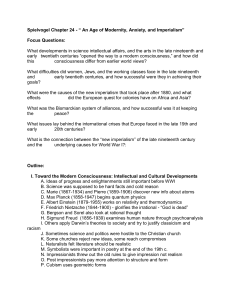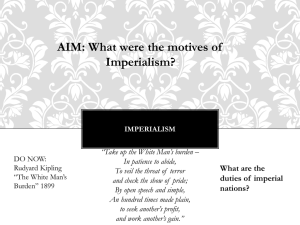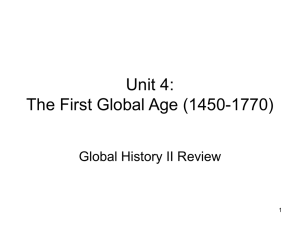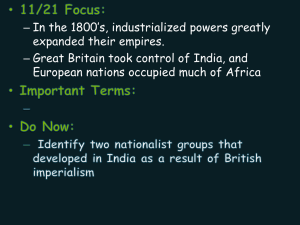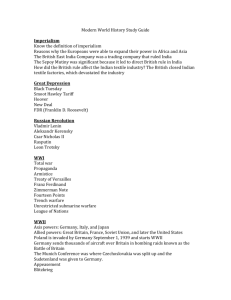UNIT 9: AGE OF IMPERIALISM NAME: Period: Mr. Justice Pod 2
advertisement
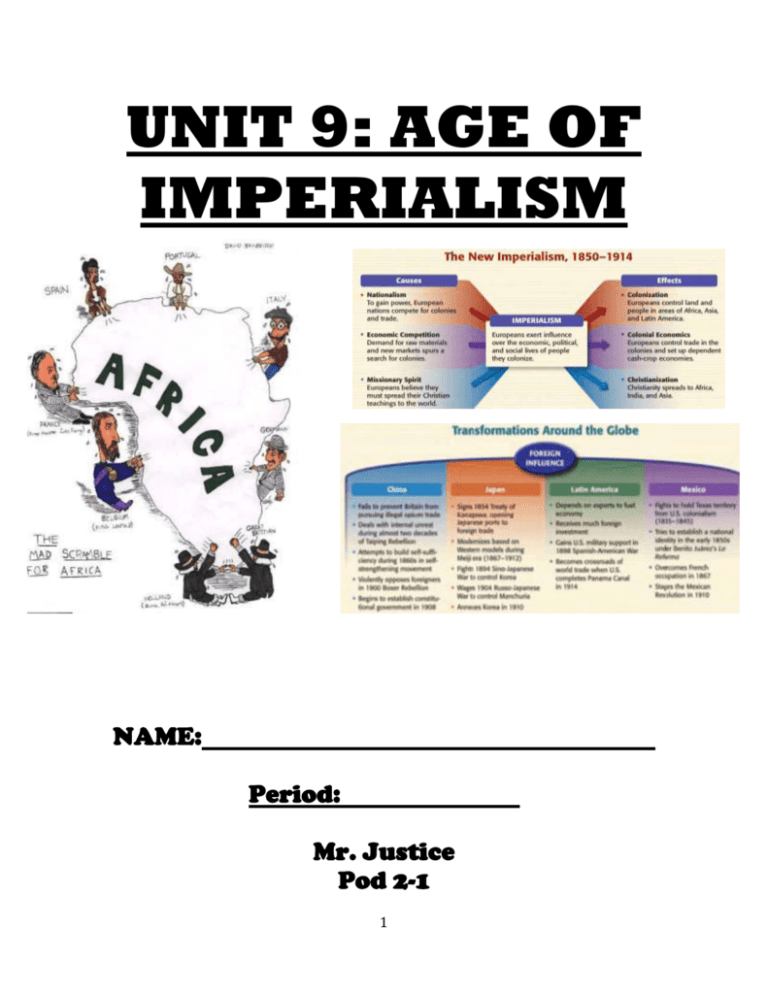
UNIT 9: AGE OF IMPERIALISM NAME: Period: Mr. Justice Pod 2-1 1 Very Important Terms Term Definition Importance 1. Imperialism 2. Social Darwinism 3. Paternalism 4. Nationalism 5. Berlin Conference 6. Sepoy 7. “Jewel in the Crown” 8. Annexation 9. Raj 10. Opium War 11. Open Door Policy 12. Boxer Rebellion 13. Roosevelt Corollary 14. La Reforma 2 Activity A:Remember The Causes for Imperialism: 1.) Economic - motives included the desire to make money, to expand and control foreign trade, to create new markets for products, to acquire raw materials and cheap labor, to compete for investments and resources, and to export industrial technology and transportation methods. 2.) Political- motives were based on a nation's desire to gain power, to compete with other European countries, to expand territory, to exercise military force, to gain prestige by winning colonies, and to boost national pride and security. Remember about Nationalism!!! 3.) Religious- motives included the desire to spread Christianity, to protect European missionaries in other lands, to spread European values and moral beliefs, to educate peoples of other cultures, and to end slave trade in Africa. 4.) Exploratory- motives were based on the desire to explore "unknown" or uncharted territory, to conduct scientific research, to conduct medical searches for the causes and treatment of diseases, to go on an adventure, and to investigate "unknown" lands and cultures. 5.) White Man’s Burden- motives included the belief in Anglo-Saxon racial superiority, also known as Social Darwinism. European’s and Americans saw it as their duty to spread civilization, including Christianity, to the rest of the un-civilized world. Racism played a large role in the justification of Imperialism as well. Now that you have learned what Imperialism is and the reasons nations took part, look about the room at the different examples of European Imperialism on the walls, match all 6 cases with the correct symbol based on the reasoning behind each action. 3 BERLIN CONFERENCE Starting about 1880, European countries engaged in a scramble/competition to obtain the most amount of free land as possible. Competition arising, the European Nations met at the Berlin Conference in 1884-85 to create rules of Africa’s division. No diplomat representing Africa was in attendance. Surprised to not find a large market to sell their goods, Africa’s major source of wealth was its abundance of raw materials, such as copper, tin, peanuts, palm oil, gold, and diamonds. What was the imperialistic motive here? Explain how you know (3-5 sentences). What clues etc.? 4 The Boer War Dutch settlers known as the Boers had gradually taken African farmland and established a large farm system. Britain took over the Cape Colony in the early 1880s, and decided to established political and military control over the Boers, which they did not appreciate. After diamonds and gold were discovered in southern Africa, Britain decided it was time to take full control in order to strengthen themselves at home and abroad in the colonies. Boers using guerilla tactics introduced what some call a “total war”, the British countered by burning farms and putting women and children in concentration camps. Britain finally won in 1920, colonies created more National Power and Prestige. What was the imperialistic motive here? Explain how you know (3-5 sentences). What clues etc.? 5 Assimilation In order to establish more direct control over their colonies, because the French and other nations believed Africans unable to handle the complexity of running a country, the French turned towards a policy of paternalism and assimilation. Paternalism means that they were governed directly by a European power, but were given no rights as a citizen of the colony. Assimilation meaning that in time, the local people would adopt French culture and language, becoming like the French. This policy was adopted because of the belief of the inferiority of African culture and institutions compared to those of European nations. What was the imperialistic motive here? Explain how you know (3-5 sentences). What clues etc.? 6 The Crimean War Geopolitics took a large role during the period of imperialization, and it means a nations interest in land for its strategic position or products, this played a role in Russia vs. Ottoman Empire. The Ottoman Empire controlled all access to the Mediterranean and Atlantic sea trade, creating jealousy from Russia due to their cold weather ports. In an effort to gain control of more trading routes, specifically warm weather ports, the Russian empire began the Crimean War in 1853 to take Ottoman lands. Britain and France entered the war alongside the Ottoman Empire, leading to the eventual defeat of Russia. However, the war exposed just how weak the Ottoman Empire was. The Ottoman Empire began to rapidly lose land and power, leading all the way to WWI. What was the imperialistic motive here? Explain how you know (3-5 sentences). What clues etc.? 7 The Sepoy Mutiny By about 1850, the British controlled most of India, and considered India to be the “Jewel in the Crown” due to its immense population and natural resources. Setting up restrictions that limited the Indian economy, meaning all competition was taken away from the economy, the local population began to feel resentful about the racism and economic control that the British had over them. Nationalism spread throughout the Indian population, and in 1857, Indian soldiers known as Sepoys disregarded command, and the next day they rebelled. The rebellion spread, and the East India Company list control for over a year until Britain sent aid. As a result of the rebellion Britain took direct control over all of India, and the event fueled the racist attitudes of the British toward Indians, and the distrust between the 2 groups intensified. What was the imperialistic motive here? Explain how you know (3-5 sentences). What clues etc.? 8 Industrialization Aids Exploration The need and drive for colonies and spheres of influence did not begin in the 19th century, but rather as soon as European countries created strong nations, which happened around the 16th and 17th centuries. However, in such large continents like Africa, India, and Asia, it was impossible to expand a nations reach from past the coast. Once the steam engine was created and used within the new boats and locomotives, new exploration was possible, including the discovery of the Nile River and its vast potential. All of Africa was now available for nations to invade, the rest of the world not far behind. Some individuals however, such as David Livingstone, only wanted to explore new lands and promote Christianity deep into Central Africa. What was the imperialistic motive here? Explain how you know (3-5 sentences). What clues etc.? 9 Activity B: CHOOSE ONENewspaper Article: You must write a newspaper article that describes the developments of imperialism in Africa, from its start to its end, advocating for or against imperialism. OR Create a political cartoon that illustrates the progression of European imperialism in Africa (You must include all four boxes in each of these options 10 Activity D: Answer Questions One and Two From The Chart Below: 1. 2. 11 Activity C: Effects of British Imperialism on India Positive Effects The British built the world’s third largest railroad network in India Railroads and telegraphs united the subcontinent The British developed a modern road network and built dams and irrigation canals Sanitation and public health improved Negative Effects The British restricted Indian-owned industries such as cotton textiles The British emphasis on cash crops resulted in a loss of self-sufficiency for many villagers Famines increased as cash crops reduced food production Indians faced discrimination from the British in their own land Ultimately, the British wanted India’s resources for its factories. Indian resources were exported to Great Britain and converted into manufactured goods that were sold throughout the world. Of course, manufactured goods were more profitable than raw materials. As such, India exported cheaper resources and was forced to import expensive manufactured goods. By not allowing Indian industries to compete, the subcontinent experienced great poverty. The Indian people suffered as India became an exporter of cash crops and an importer of more expensive finished goods. Directions: After examining the chart above, do you believe the British occupation of India was justified (acceptable). Take a position below and write your answer in complete sentences. __________________________________________________________________________________________ __________________________________________________________________________________________ __________________________________________________________________________________________ __________________________________________________________________________________________ __________________________________________________________________________________________ __________________________________________________________________________________________ __________________________________________________________________________________________ ________________________ 12 13 14




